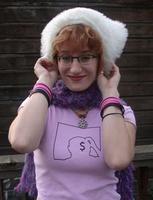| Friday, February 13, 2004 |
| Lessons from social networking |
 Danah Boyd gave a speech at the Emerging Technologies conference a couple of days ago which seems quite interesting, looking at the transscript. She goes through various kinds of research related to social networks. Things that have been learned, things that don't work, misunderstandings, etc. Danah Boyd gave a speech at the Emerging Technologies conference a couple of days ago which seems quite interesting, looking at the transscript. She goes through various kinds of research related to social networks. Things that have been learned, things that don't work, misunderstandings, etc.
Like the famous 6 degrees of separation. The well-known experiment found random people to be on the average 5.5 hops away from other random people. But that was when they had to guess at who they should contact to get to somebody else, and when they didn't really know. It would be different if we could actually see the whole network. Like, fewer jumps. Research has shown that people often find, for example, jobs through weak ties. I.e. people you know, but not very well. And online social networks usually try to mimic a setup of having strong ties and weak ties, and one of the implications is that it would help you get jobs and dates. But the friends you have in an online network aren't necessarily like the friends in real life, and the friends or those friends are not really like the weak tie connections in your life. And there's the matter of context. Just because you know somebody, even very well, in a certain context, doesn't mean you feel comfortable about doing things for them in another context. It might not seem right to make an introduction to a job you know nothing about, just because you often go out drinking with somebody. And the expectation of your connections that you'll do that kind of favors for them sort of wears on you and your actual network. "Asking favors is fundamentally different than offering them. People gain by being bridges. Thus, to be able to tell you about a job gives me whuffie in our relationship. Feeling pressured to connect you to an open job makes me uncomfortable. In all of the networks described above, the bridge got to control the information flow. In Milgram's "Small Worlds," if you didn't know that i knew the target person, you may not have tried to pass it on to me. If you don't know that i am dating someone who has something that you want, you won't try to pressure me into giving you access to it. Thus, i can choose when to reveal my connections in a situation where i can come across as being helpful, rather than being put in a position to feel cornered. Revealing the network shifts the power."Which reminds me that a few of the best networkers I know wouldn't really dream of using an online network where you list all your friends, and catalogue everything you're into. I get to think of one friend who's name I'm not even going to mention. We only talk at the most once per six months or a year. But every time we talk for an hour or so, and usually he introduces me to some concept or project or person that he carefully has handpicked for me. And each time it is very valuable and appropriate. And he wouldn't dream of just introducing everybody in his rolodex to everybody else. So, even though there are lots of benefits from free-flowing networking and sharing a lot of things in blogs, all of those connections aren't necessarily what they seem. Some connections are really weaker than they seem, and some are more important than is apparent. And the properties of the network interface makes people do all sorts of things that might obfuscate the real story. We still don't really have all the solutions. Social behavior doesn't necessarily have merely technological solutions. [ Organization | 2004-02-13 20:04 | 1 comment | PermaLink ] More > |
| Everything depends on the context |
 Denham Grey: Documentation & knowledge. A oft repeated question / assertion in KM is the link between explicit documentation and knowledge. The point I'm trying to make, is documentation alone does not = knowledge. To retain knowledge against attrition you have to have a community that can appreciate the context, understand the issues, talk the language, adopt the assumptions, share the tricks, interpret and adapt the explicit stuff to changing external circumstances."How about if no document can possibly be knowledge. Knowledge is meaning and shared understanding. Some representation of data might contain more or less information, depending on how much signal is there, and if there's a way of reading it. And the information only becomes knowledge to the degree that I draw meaning from it. If it is in a language I don't understand, there would be close to zero knowledge for me. But does it have to be actioable? I don't necessarily think so. It has to enable the action on my part of acquiring, possessing and changing meaning. I might find some new meaning, or I might be reminded of what I already know. But, depending on the context, I might or might not be happy with the mere knowledge, without having anything particular to go and do with it. It might just become part of me, and thus become wisdom. Which might mean that I might be more able and capable to act or not in the future, without any longer having to keep track of what information or knowledge enabled me to do so. [ Knowledge | 2004-02-13 20:39 | 1 comment | PermaLink ] More > |